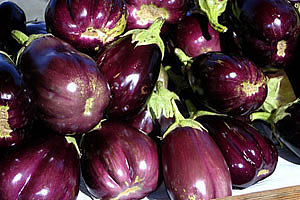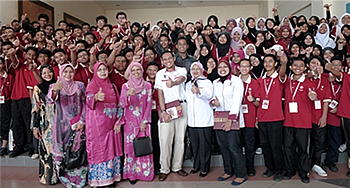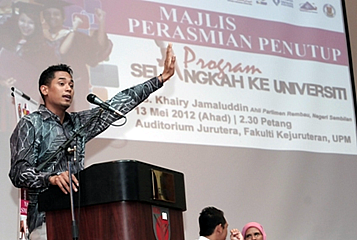- Details
- Category: 2012
 21 4
21 4
The University of the Philippines Los Baños (UPLB) has been at the forefront of biotechnology research and development in the Philippines with the establishment of the Institute of Plant Breeding (IPB) and the National Institute of Molecular Biology and Biotechnology (BIOTECH). At present, it maintains its support for the multi-location field trials of the fruit-and-shoot-borer resistant Bt eggplant despite a petition filed against the experiment by Greenpeace Southeast Asia and other anti-GMO groups.
The UPLB administration stressed the importance of strengthening the trans-disciplinary scientific approach to research and problem solving of the University, and calls on other sectors to support the continuation of the Bt eggplant field tests.
The Bt eggplant project, already on its 10th year of implementation, is a priority project of UPLB in accord with its pro-people and pro-environment agenda. The current field trials are being responsibly and safely undertaken together with scientific organizations and partner state universities in compliance with the biosafety requirements and guidelines approved by national regulatory bodies such as the National Committee on Biosafety of the Philippines (NCBP) and the Bureau of Plant Industry of the Department of Agriculture.
The objective of the project is to help advance the welfare of small farmers, the consumers, and the environment. UPLB conducts the field trials in accordance with the biosafety guidelines issued by the NCBP and clearly stipulated in the Department of Agriculture Administrative Order No. 8 S-2002 which are compliant to the global biosafety standards under the United Nations Convention on Biological Diversity, specifically the Cartagena Protocol on Biosafety.
Ecological balance and environmental safety are non-negotiable core values of the University in the conduct of research. Anti-GMO organizations must rest assured that the University is wholly committed in conducting responsible research on safe and beneficial technologies. While the University recognizes other people's right to their own opinion, the diversity of ideas and opinions which all modern democracies guarantee requires that the rights and freedoms, especially the academic freedom of a university like UPLB must be accorded the same respect and recognition.
Condensed from: UPLB News|April 2012
- Details
- Category: 2012

A study that looks into the influences, knowledge seeking, and knowledge sharing dynamics of Filipino farmers in adopting biotech crops was co-published in March 2012 by the Southeast Asian Regional Center for Graduate Study and Research in Agriculture (SEARCA), the International Service for the Acquisition of Agri-biotech Applications (ISAAA), and the College of Development Communication (CDC) of the University of the Philippines Los Baños.
“Adoption and Uptake Pathways of Biotechnology Crops: The Case of Biotech Corn Farmers in Selected Provinces of Luzon, Philippines”, authored by Dr.Cleofe Torres, et al., focuses on how farmers came to adopt biotech corn, the process they go through when they acquire and apply the knowledge and practices in cultivating biotech corn, and the dynamics in their experience sharing, among others.
The study was conducted in Pangasinan, Isabela, and Cagayan, which are major corn producing provinces in the northern part of the country.
“Adoption” is defined as “how the farmers acquire and eventually apply the knowledge and practices pertaining to the planting of biotech crops.” “Uptake pathway” is the “process that captures how the information and knowledge about biotech crops are introduced to, or accessed, adopted, disseminated, and shared by the farmers to others.”
Economic consideration was a major factor found to influence farmers in adopting biotech corn. Particularly, the farmers’ reasons for adoption include: having fool-proof assurance of high yield and better income; influence of fellow farmers and relatives who are already adopting the technology; and their desire for their farms to be free from infestation of corn borers once the adjacent plantations become pest resistant biotech corn farms.
The study explained that there were some “late adopters” because of lack of capital and, for some farmers, hesitation. However, upon seeing the high yield and income of early adopters, these farmers switched to biotech corn and eventually shared the experience to other farmers and relatives.
Higher income was found to be the major benefit that came from the adoption of biotech corn. It consequently helped the farmers send their children to school, make farming activities easier and simpler, pay their loans and debts, etc. The farmers also noted that they have acquired “peace of mind” (assurance of harvests due to insect pest resistance) from biotech corn adoption.
Meanwhile, through an exercise called the “innovation tree”, a method that helps visualize and analyze the spread of an innovation or technology over time, between and among community members, the uptake pathways were constructed from two to four communities in each of the three provinces. It was found that multiple actors were involved in the circulation of knowledge and information on biotech corn.
Key players in the uptake pathways include the farmers, who are also the early adoptors of biotech corn. On the other hand, initiators of the uptake pathways were the technicians of seed companies, who introduced the technology to the farmers through demonstration farms and seminars. The traders were also major players as they endorsed the technology to the farmers and assured them that they would provide the necessary capital for planting. There were also “local ambassadors” who offer technical assistance, visit the farms and testify to the benefits of biotech corn.
Since traders and seed suppliers were identified as key partners in biotech extension, the study noted the importance of including the private sector in extension services and education, as well as field demonstrations and knowledgeable extension workers.
The study also noted that with their positive experience in biotech corn adoption, the farmers were resolved to continue adopting the technology, as well as other biotech crops such as the fruit and shoot borer resistant Bt eggplant, once these are commercialized. These farmers were also stated to be keen to learn more about biotech crops, hence the need for more effective biotech education endeavors.
SEARCA Director Dr. Gil C. Saguiguit, Jr., ISAAA Global Coordinator Dr. Randy A. Hautea, and CDC Dean and Project Leader Dr.Cleofe S. Torres, wrote in the study’s foreword that after more than 15 years of global commercial use, biotech crops have demonstrated the immense benefits they can contribute in terms of economic productivity, environmental protection, and upliftment of the welfare of poor farmers in many parts of the world.
With appropriate biosafety regulations in place, the Philippines started planting biotech crops in 2003. The insect resistant Bt corn, the herbicide tolerant corn, and stacked corn, were reported in published studies and articles to significantly increase the yields and income of Filipino farmers, thus helping boost the corn industry of the country. In its decade of propagation, hundreds of thousands of Filipino farmers have used the technology, and almost two million cumulative hectares of farms grown to biotech crops in the country have provided solid and clear evidence that the approved biotech crops benefit the farmers.
Source: SEARCA-BIC|10 May 2012
- Details
- Category: 2012

In order to expose and motivate the rural students about the importance of education, a total of 150 students from 17 secondary schools visited the Universiti Putra Malaysia as part of the Selangkahke Universiti 2012 Program or Step to the University Program.

The event, organized by Badan Amaldan Kebajikan Tenaga Isteri-Isteri (BAKTI) and UPM, gathered rural students from families who have never set foot in a university. Through this initiative, the program proponents believe that the rural youth can be motivated to study hard, break free from poverty and foster a culture of love for science.
During the visit, the students were given a glimpse of the campus life at the UPM by visiting the Faculty of Laboratory Medicine and Health Sciences Complex, Food Service, UniversityVeterinary Hospital, Putra FM radio stations, Faculty of Modern Languages and Communication and Motion Capture, Information and Development Centre Communication (iDEC).
Khairy Jamaluddin, member of Parliament for Rembau, Negeri Sembilan, said that through the program, the government can produce students that think critically and have a genuine appreciation of education. By exposing these students to the academe, they can help discover the career they want in the future.
Source: UPM News|13 May 2012
- Details
- Category: 2012
Each year, almost a million people, a large proportion of whom are children, require hospitalization for severe dengue. A new portable tool to detect dengue virus-infected mosquitoes aims to reduce the likelihood of human infections around the world.The simple diagnostic tool, developed by Dr. David Muller and colleagues from The University of Queensland (UQ) and research groups in Melbourne and South America, can now be used in the field to detect dengue infection in large numbers of mosquitoes.
“Unlike other approaches to mosquito surveillance, this new tool provides information on whether mosquitoes are carrying dengue,” Dr. Muller said.“It is rapid, specific, and does not require specialized equipment or personnel.This means it will be viable for use in developing regions of the world where dengue is a significant health and economic burden,” he said.
Almost half of the world's population is at risk of contracting the virus which is transmitted to humans by the bite of an infectious female mosquito. In fact, over 100 million people each year are infected globally, resulting in mild debilitation or even life-threatening complications of dengue hemorrhagic fever.
Suppressing mosquito populations is one way that local authorities try to reduce transmission of the virus, and finding the location and incidence of infected populations allows a rapid response to control the spread of the disease.
Professor Paul Young, leader of Dr. Muller's team at the Australian Infectious Diseases Research Centre, said that rigorous field testing was still being conducted.“The goal of this work is to provide the tools to not only assess mosquito numbers in the field but also their infection status," he said. "This information could then be directly uploaded with GPS information via mobile devices to coordinating centers.
“The availability of real-time monitoring of dengue presence within the mosquito population would be a valuable addition to early warning monitoring programs and should result in more effective mosquito control responses by local health authorities,” Professor Young said.
News of the new diagnostic tool has been published in the international Journal of Virological Methods.
Source: UQ News|21 May 2012
- Details
- Category: 2012

Bogor Agricultural University (IPB) signed a collaborative agreement with the Local Government of Depoka city in West Java province, Indonesia - to support the government's program on food diversification. With the collaborative agreement, IPB will provide analog riceto meet the demands of the One Day No Rice (ODNR) program in Depok. Analog rice is made from corn and sago developed by the Faculty of Agricultural Technology in IPB.
According to Depok Mayor, Nur Mahmudi Ismail, the municipality has been running the program since February 2012. Its government offices practice ODNR every Tuesday by replacing rice with boiled crops such as maize, sweet potatoes, and potatoes. To be sustainable, the program should also offer a well-balanced and varied menu. Snack foods such as instant noodles and meatballs noodles, which are made from flour, also have to be replaced with local ingredients. In this regard, the city's partnership with IPB is very advantageous, with IPB's track record in food technology innovations such as non-wheat-based noodles.
During the signing of the agreement, IPB demonstrated how to cook fried analog rice. Aside from the cooking demo, a variety of dishes made from analog rice and corn noodles were also served.
Dr. Sam Herodian, dean of the Faculty of Agricultural Technology in IPB said that for starters, theycan supply the amountof analog rice needed bythecanteens within the local government of Depok.
Source: IPB News|24 May 2012
 21 4
21 4


















